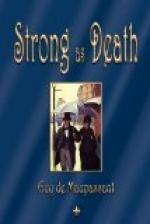PART II
CHAPTER I
A WILLING ENVOY
“Paris, July 20, 11 P. M.
“MY FRIEND: My mother has just died at Roncieres. We shall leave here at midnight. Do not come, for we have told no one. But pity me and think of me. YOUR ANY.”
“July 21, 12 M.
“MY POOR FRIEND: I should have gone, notwithstanding what you wrote, if I had not become used to regarding all your wishes as commands. I have thought of you with poignant grief ever since last night. I think of that silent journey you made, sitting opposite your daughter and your husband, in that dimly-lighted carriage, which bore you toward your dead. I could see all three of you under the oil lamp, you weeping and Annette sobbing. I saw your arrival at the station, the entrance of the castle in the midst of a group of servants, your rush up the stairs toward that room, toward that bed where she lies, your first look at her, and your kiss on her thin, motionless face. And I thought of your heart, your poor heart—that poor heart, of which half belongs to me and which is breaking, which suffers so much, which stifles you, making me suffer also at this moment.
“With profound pity, I kiss your eyes filled with tears.
“OLIVIER.”
“Roncieres, July 24.
“Your letter would have done me good, my friend, if anything could do me good in the horrible situation into which I have fallen. We buried her yesterday, and since her poor lifeless body has gone out of this house it seems to me that I am alone in the world. We love our mothers almost without knowing or feeling it, for such love is as natural as it is to live, and we do not realize how deep-rooted is that love until the moment of final separation. No other affection is comparable to that, for all others come by chance, while this begins at birth; all the others are brought to us later by the accidents of life, while this has lived in our very blood since our first day on earth. And then, and there, we have lost not only a mother but our childhood itself, which half disappears, for our little life of girlhood belonged to her as much as to ourselves. She alone knew it as we knew it; she knew about innumerable things, remote, insignificant and dear, which are and which were the first sweet emotions of our heart. To her alone I could still say: ’Do you remember, mother, the day when—? Do you remember, mother, the china doll that grandmother gave me?’ Both of us murmured to each other a long, sweet chapter of trifling childish memories, which no one on earth now knows of but me. So it is a part of myself that is dead—the older, the better. I have lost the poor heart wherein the little girl I was once still lived. Now no one knows her any more; no one remembers the little Anne, her short skirts, her laughter and her faces.




